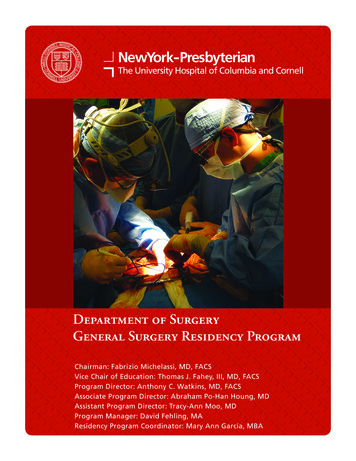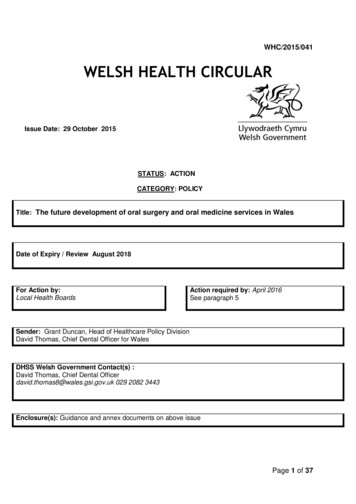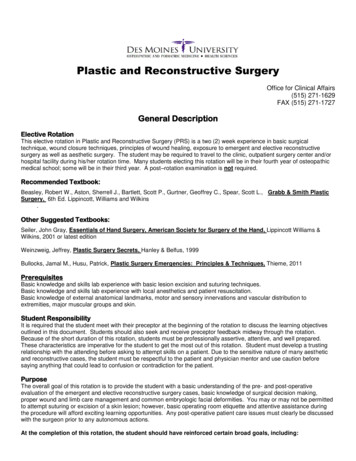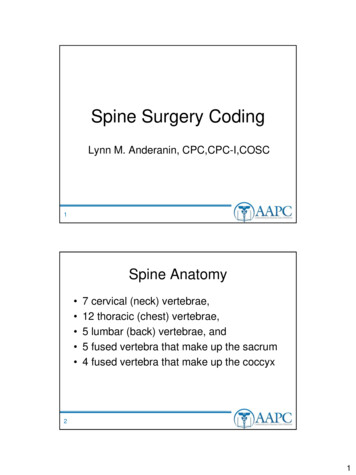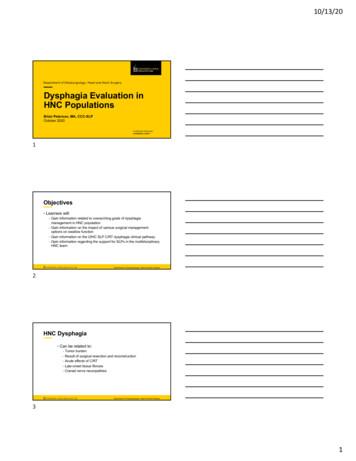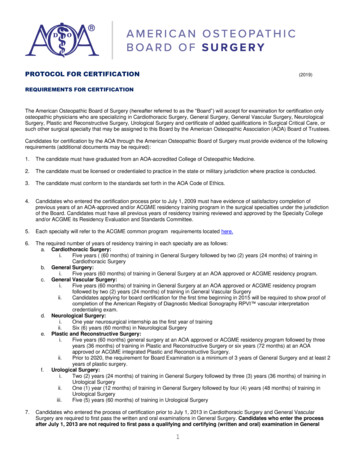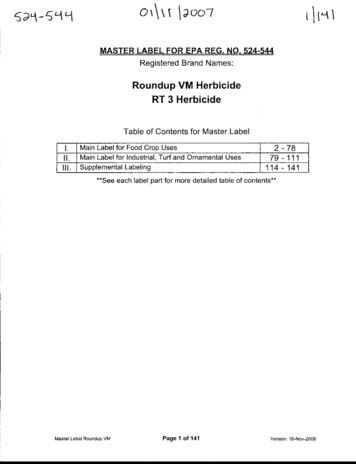
Transcription
Getting ready for surgery:A guide for patients
Welcome to theSurgery Centerat Sawgrass.Getting Readyfor SurgeryFeeling anxious about surgeryis natural. But we’re here to help.Having surgery is a big deal. So it’s natural tofeel anxious, to have questions–and to want tounderstand exactly what’s going on.This booklet is here to help. It contains all theinformation you need to feel more comfortableabout your upcoming surgery.Read it over, and use our helpful checklists tobe sure you have everything covered. It will helpyou to come in feeling confident and totallyprepared on the day of your surgery.Dr. Sonia Pyne,Director of AnesthesiaDr. Michael Maloney,Medical DirectorPre-Surgical ScreeningBefore you have your surgery, you will get a callfrom our pre-surgical screening nurse. Duringthis call, you will discuss your medical historyand which medications you’re currently taking.Make sure you pay close attention–and keep apen or pencil handy–because this is when youwill learn which medications you need to stoptaking before your surgery.You may need to meet with an anesthesiaprovider before your surgery. If you need tobe seen, our scheduler will give you a call andarrange a convenient time to meet with amember of the anesthesiology team.Medication RestrictionsMedications and supplements can haveamazing benefits for your health. But you mayhave to stop taking them before your surgery.The pre-surgical screening nurse will discussthis with you. In the meantime, here are a fewguidelines to keep in mind.Unless otherwise specified by your surgeon,please do not take anti-inflammatory medicationlike Aleve, ibuprofen or Motrin. Thesemedications pose a bleeding risk and shouldbe stopped at least five days before your surgery.If you are not sure whether you should stop amedication, please call your surgeon’s office.Anticoagulants or blood thinners like aspirin,Coumadin, Plavix and Heparin also pose ableeding risk. If you take these medications,make sure you tell your pre-screening nurse andtalk to your doctor about when you should stoptaking them prior to your surgery.Stop taking herbal supplements or vitaminsat least two weeks before your surgery.These products contain unregulated amountsof active ingredients and can have unplannedside effects on a surgery.Food and Drink RestrictionsWhat you eat before your surgery might notseem that important, but remember: every part
of surgery is important. So make sure youfollow food and drink restrictions to the letter.Otherwise your surgery may have to be delayed–or even cancelled–for safety reasons. Here are the most important things to know: We will call the day before your surgery between2 to 5 p.m. We will provide you with your arrivaltime and detailed instructions on what time youneed to stop eating and drinking. Make sure you follow your eating anddrinking instructions exactly. Otherwiseyour surgery may be delayed or cancelled. In general, patients cannot have anything toeat after midnight—this includes candy, gumand lozenges. Some patients may be asked tostop eating at an earlier time. Adults may have clear liquids up untilfour hours before arrival time. Clear liquids include water, apple juice,colas, Gatorade and Pedialyte. Pediatric patients may have clear liquids upuntil three hours before arrival. Dental patients may not have anything to eator drink after midnight. Formula-fed infants may have formula up tosix hours before arrival time. Breast-fed infants may have breast milk up tofour hours before arrival time. Call the Surgery Center at 585.242.1401 ifyou have any questions. What to Bring to Your SurgeryNecessary ItemsThese items are necessary for you to have yoursurgery. Make sure you bring all that areapplicable to you. Photo ID Insurance card Prescription card Advance directive (if you have one) Court-issued guardianship document(for legal guardians) CPAP mask (if you have sleep apnea)Support equipment if you have it (sling, kneebrace, crutches, cane, walker)Loose-fitting clothingDentures, hearing aids, glasses andother necessitiesAdditional Items for ChildrenThese items will make your child feel more safeand relaxed going into surgery: Comfort item like a pacifier, blanket,pillow or toyElectronic games (yes, we do have Wi-Fi)Extra set of clothes including underwear incase of accidentsDiapers or Pull-UpsSippy cup or bottle with formula or a favoritejuice for after surgeryItems to AvoidContact LensesContact lenses are easy to forget about and cancause injury if left in during surgery. Make thingseasier on yourself: wear your glasses. If youchoose to wear your contacts, you will be askedto remove them before going into the OR.JewelryAll jewelry and piercings need to be removed priorto your arrival. This includes your wedding ring.Jewelry presents a risk of injury during surgeryand isn’t always easy to remove in an emergency.Perfume, Body Lotions, Makeup andFake EyelashesSubstances that you wear on your body can getinside the surgical site and cause infections orother complications. Wash everything off thenight before your surgery, especially anyeye makeup.Additional Pre-Surgery NotesIllnessIf you’re feeling sick before your surgery, call yoursurgeon’s office immediately.Pediatric Facility ToursJust like the rest of us, children can be frightened bywhat they don’t understand. If your child is feelingnervous about an upcoming surgery, you canschedule a tour of the facility to help ease your child’sfears. Call 585.242.1401 to arrange for a tour.Making ArrangementsA surgery’s success is decided by what happensoutside the operating room, too. Save yourselfthe trouble of trying to do other things whenyou should just be recovering. Make thesearrangements before your surgery:Adult PatientsFigure out how you will get home.You will need to be supervised following anesthesia.You will not be able to drive yourself home. Andeven if you plan on taking a cab or taxi, you willneed to bring someone along with you to make sureyou get home safely. Call a family member or friendtoday and make sure you have a way to get homefrom the surgical center.Arrange childcare for children under 14.Younger children are not allowed in the treatmentareas and can’t be left unsupervised in the waitingroom. Arrange for a babysitter or drop your childoff with a family member or friend before youhave surgery.Pediatric PatientsDecide who will stay at the center during yourchild’s surgery.At least one parent or legal guardian will need tostay in the building for your child’s surgery to beon hand for updates and decision-making.We recommend having two adults availablefor the ride home.Your child will most likely feel tired and weakafter his or her surgery. We recommend havingtwo adults on hand for the ride home–one todrive, and one to care for your child.
Day of Surgery WalkthroughIt’s normal to feel a little stressed on the day ofyour surgery. That’s why we do our very best tohelp the process run smoothly and put you at ease.Here’s a quick summary of what to expect on theday of your surgery.Arrival You will receive your scheduled arrival timeafter 3 p.m. on the business day before yoursurgery. (Monday surgeries will receive a callthe previous Friday.) Your arrival time willtypically be 1 to 2½ hours prior to yoursurgery. The extra time before yoursurgery will be used to go over your healthinformation and prepare you for surgery. Once you arrive, go to the reception desk tobegin registration. After you’ve finished registering, you maygo to the waiting area. A healthcare providerwill be with you shortly.Pre-Surgery The healthcare provider will take you to thepre-operative area and ask you to provide aurine sample (if necessary). All femalepatients of childbearing age will need to takea urine pregnancy test at this time. Next, you will continue to your pre-op room. A registered nurse will review your healthinformation and check your vitals. At this time, you’ll remove your clothing andchange into a patient gown and slipper socks. After the nurse meets with you, two people–such as adult family members, your significantother or a friend–will be able to wait with you. You will also meet with the operating roomteam to review your health history andanesthesia plan. Once you are fully prepared, you will beescorted to the operating room. Anyone withyou at this time will return to the waiting area.Post-Surgery After your surgery, you will be taken to therecovery room. Up to two family membersor friends will be able to visit you once youare awake and comfortable. Family members of pediatric patients will beescorted to the recovery room as soon as thechild arrives there. Your discharge time will depend on howyou’re feeling as you recover from anesthesiaand by the type of surgery you had. If youhave local anesthesia, you will probably bedischarged after 15-30 minutes. If you havegeneral or regional anesthesia, you will need towait 30 minutes to two hours. Once you’re ready to go home, a nurse will goover your post-operative instructions andanswer questions before you will be able toleave. So remember to set up your ride home!For Families:While You WaitWaiting while your loved one has surgery can beone of the hardest things in the world. We’ll doour best to help you through the wait with peaceof mind–and make sure you see your familymember or friend as soon as possible afterwards.In the meantime, there are a few things you cando to make the wait a little bit easier:Bring something to do.Whether it’s a book, magazine, tablet or videogame, it’s always a good idea to keep your mindoccupied while you wait. And yes, we do have Wi-Fi.Don’t go hungry.Waiting is even worse when you’re hungry.We recommend you bring something to eatalong with you. In case you forget, you can takeadvantage of our vending machines and freehot beverages.Ask questions.If you’re worried about your loved one’s surgery,talk about it beforehand. You might be able toease everyone’s fears. Be sure to ask any questionsthat come up right before surgery. Waiting ismuch easier if you don’t have unansweredquestions that you’re worried about.DirectionsHere are some basic directions to get to theSurgery Center at Sawgrass. You can find moredetailed instructions by going online or callingus at 585.242.1401. Based on your starting location, take either390N or 390S to the NY-15/East HenriettaRoad exit.Head north on East Henrietta Road.Turn right onto Westfall Road.Turn right at the light onto Sawgrass Drive.Your destination will be on the left at180 Sawgrass Drive.Additional ResourcesOn-Site PharmacyFor your convenience, we operate an on-sitepharmacy from 7 a.m. to 3:30 p.m. so you can getyour prescriptions filled–and get home–faster.Guest ServicesIf you’re traveling from out of town, our GuestServices Department can help you find a place tostay at reduced prices. Just call 585.275.7581.Pediatric ToursA tour can make you and your child feel morecomfortable about going through surgery.To schedule a free tour of our facilities, just call585.242.1401.Notes
We’re here for you.You can do this. And remember: we are always here to help.Thank you for trusting us to perform your surgery. If you have any other questions or would likemore information on your–or your child’s–surgery, please refer to the contact numbers below.Contact NumbersSurgery Center at SawgrassSurgery Center at Sawgrass FAXPre-Surgical Screening DepartmentGuest Services DepartmentPediatric Tourse.AvS. GoodmanSt.e.d AvhlanHig239Sawgrass Dr.15A31S. Winton Rd.Ave.Elmwood Ave.McQuaid JesuitHigh SchoolS. ClintonSouth Ave.Westfall Rd.oenrMo15585.242.1401 5.242.1401180 Sawgrass Dr.etta Rd.E. HenriEdgewood Ave.590390French Rd.EriBrighton- Henrietta Town Line Rd.102eCanalSurgery Center at Sawgrass180 Sawgrass Drive, Suite 100 Rochester, NY 14620585.242.1400 urmc.edu
pen or pencil handy-because this is when you will learn which medications you need to stop taking before your surgery. You may need to meet with an anesthesia provider before your surgery. If you need to be seen, our scheduler will give you a call and arrange a convenient time to meet with a member of the anesthesiology team.
